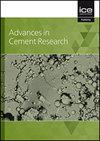Improvement of phosphate ester grinding aids on cement grinding and water-reducing performance
IF 1.3
4区 工程技术
Q3 CONSTRUCTION & BUILDING TECHNOLOGY
引用次数: 0
Abstract
Phosphate ester polymers were prepared from phosphate ester monomers for the first time, and their effects on cement grinding and water-reducing as grinding aids were studied. FT-IR, standard viscosity, setting time, mortar fluidity, mortar compressive strength, etc., tested phosphorus series products’ properties. The results show that: (1) Dibutyl hydroxyethyl phosphate can reduce the residue of 45 μm and 80 μm grinding sieves by 68.67% and 98.67%, respectively. (2) By comparing with triethanolamine (TEA). It is found that the grinding effect of hydroxyethyl dibutyl phosphate is not only better, but also the optimal mixing amount is smaller, only 0.167%. Under the same grinding amount, the grinding time can be shortened by 30%, and under the same grinding time, the grinding output can be increased by at least 20%. (3) Polymer grinding aids can significantly improve the fluidity of cement paste by 40.06%, which can make the water-reduction rate of cement mortar reach more than 20%. The experimental results show that as a new generation of grinding aids system, phosphate ester grinding aids not only have a significant grinding effect but also have high molecular designability, which will significantly enrich the grinding aids market and effectively promote energy conservation and emission reduction in the grinding field.磷酸酯助磨剂对水泥粉磨和减水剂性能的改善
首次以磷酸酯单体为原料制备了磷酸酯聚合物,研究了其作为助磨剂对水泥粉磨和减水剂的影响。FT-IR、标准粘度、凝结时间、砂浆流动性、砂浆抗压强度等测试了磷系列产品的性能。结果表明:(1)磷酸羟乙基二丁酯可使45 μm和80 μm磨筛的残渣分别降低68.67%和98.67%。(2)与三乙醇胺(TEA)比较。结果表明,磷酸羟乙基二丁酯的磨矿效果较好,且最佳掺量较小,仅为0.167%。在磨削量相同的情况下,磨削时间可缩短30%,在磨削时间相同的情况下,磨削产量至少可提高20%。(3)聚合物助磨剂可显著提高水泥浆的流动性40.06%,可使水泥砂浆减水率达到20%以上。实验结果表明,磷酸酯助磨剂作为新一代助磨剂体系,不仅具有显著的助磨效果,而且具有较高的分子可设计性,将显著丰富助磨剂市场,有效促进助磨领域的节能减排。
本文章由计算机程序翻译,如有差异,请以英文原文为准。
求助全文
约1分钟内获得全文
求助全文
来源期刊

Advances in Cement Research
工程技术-材料科学:综合
CiteScore
3.70
自引率
5.00%
发文量
56
审稿时长
3.2 months
期刊介绍:
Advances in Cement Research highlights the scientific ideas and innovations within the cutting-edge cement manufacture industry. It is a global journal with a scope encompassing cement manufacture and materials, properties and durability of cementitious materials and systems, hydration, interaction of cement with other materials, analysis and testing, special cements and applications.
 求助内容:
求助内容: 应助结果提醒方式:
应助结果提醒方式:


